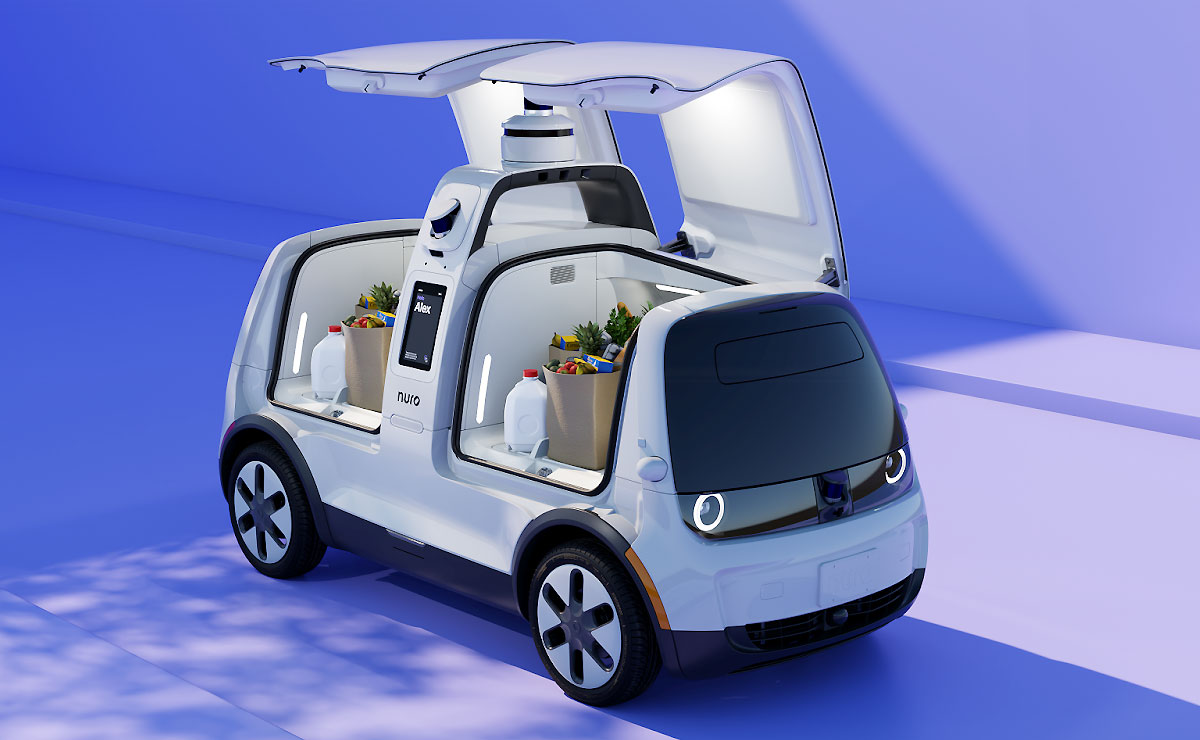<!–*/ */ /*–>*/
| Self-driving startup Nuro showcases next-gen grocery getter |

Nuro, the self-driving startup attempting to capitalize on the delivery boom by working with partners such as 7-Eleven, FedEx and Kroger, unveiled its third-generation vehicle this week.
Instead of following the sequencing of its R1 and R2 prototype predecessors, the vehicle is now simply known as the Nuro, and it offers 22 percent more carrying capacity.
New equipment aboard includes an airbag that deploys outside the vehicle in the event a collision with a pedestrian is imminent. Some features stay the same, though, notably a sensing suite that includes thermal cameras in addition to traditional cameras, lidar and radar.
One important aspect of the vehicle — there’s still no room for humans aboard the zero-occupant vehicle.
Production of the new vehicles involves a partnership with BYD North America at a factory in southern Nevada. BYD will assemble the vehicle platforms, and Nuro will upfit its self-driving systems and test the vehicles at a nearby closed-course track.
Construction of the $40 million facility began in November and is expected to be fully operational this year. Once the factory is up and running, the two companies say in a written statement they have the capacity to manufacture “tens of thousands” of vehicles per year.
— Pete Bigelow
What you need to know
About 70 CES attendees from South Korea test positive for COVID-19 About 70 South Korean nationals who attended the giant CES tech trade show in Las Vegas last week tested positive for COVID-19, health authorities of the Asian country said on Wednesday. These included some executives and staff of major South Korean companies, according to industry sources and a company official. About 20 people from Samsung Electronics and about six at SK Group, parent of energy firm SK Innovation and chipmaker SK Hynix, were among those who tested positive for the virus after attending CES, the sources said. Hyundai Heavy Industries said six of its employees who attended CES tested positive while in the U.S. and were quarantined. Some have since been released. “Multiple” Hyundai Motor and Hyundai Mobis employees who attended CES also tested positive after returning to South Korea, the newspaper JoongAng Ilbo reported, citing an unidentified industry source.
Wind River deal gives Aptiv a big pool of tech talent By purchasing software firm Wind River for $4.3 billion in cash, supplier Aptiv Inc. is not only gaining technology it will need as vehicles become more software-driven. It will also be adding a staff that includes more than 1,000 technical employees at a time when software developers, engineers, data analysts and other high-skilled workers have never been more in demand in the auto industry. The Aptiv-Wind River deal comes as automakers, suppliers and tech companies spend billions of dollars to create vehicle software capabilities, enabling more over-the-air updates that the industry hopes will provide more features and boost service revenue.
Magna hires 120 engineers, acquires self-driving tech, from Boston AV firm Canadian supplier Magna International Inc. struck a deal with Optimus Ride to hire more than 120 of the Boston self-driving shuttle company’s engineers and acquire its autonomous-vehicle technology and intellectual property. Terms were not disclosed in a statement released Tuesday. While Magna is not outright acquiring Optimus, the supplier has hired a majority of its engineers as part of the transaction.

Roundup
Valeo unveiled a third-generation, long-range scanning lidar during last week’s CES that can “detect objects invisible to the human eye, cameras and radar” at distances of more than 650 feet.
Teen hacker claims ability to control 25 Teslas worldwide.
Tesla new-vehicle registrations in the U.S. surged in November, bringing the electric automaker closer to potentially dethroning BMW as the luxury sales champ, according to data from Experian.
BMW says it will hold off on bringing battery cell production in-house.
GM showcased the latest addition to its Cadillac Halo Concept Portfolio during CES.
Magna’s new four-wheel-drive electric powertrain offers truck manufacturers a faster way to electrify.
CEO Carlos Tavares says Stellantis has its sights set on becoming an “automotive tech company,” and it’s collaborating with Amazon to make this vision a reality.
California reviews whether Tesla’s self-driving tests require regulatory oversight.
Vietnamese EV startup VinFast says it will lease batteries to customers rather than include them as standard equipment.
Brain food
“VinFast could follow in the footsteps of automakers from Japan and South Korea and become a force in North America,” Automotive News engineering reporter Richard Truett writes.
Last mile
Guinness World Records has recognized a team of drivers in a Porsche Taycan Cross Turismo for the greatest altitude change ever achieved by an EV, Porsche said. The 3.1-mile vertical trip started on Sept. 28 in an underground mine in Michigan and ended Sept. 29 at the top of Pikes Peak in Colorado, said Porsche spokesman Calvin Kim.